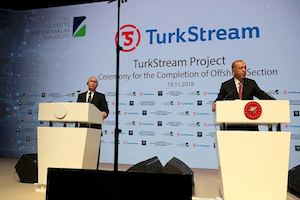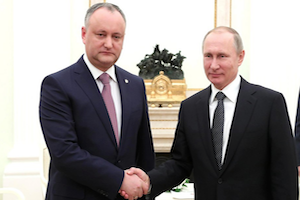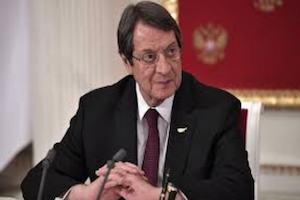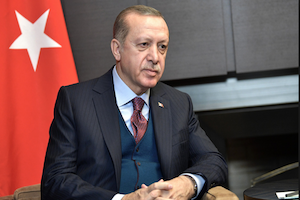TurkStream: Ankara Embraces Russia to Further Turkey's Hub Ambitions
By Micha’el Tanchum
December 20, 2018
On November 19, 2019, Turkish President Recep Tayyip Erdoğan and Russian President Vladimir Putin held a joint ceremony in Istanbul to mark the completion of the offshore segment of Turkstream, the undersea pipeline that will transport Russian natural gas to Turkey via the Black Sea. Turkstream's now inevitable realization forms a stunning reversal of Turkish energy policy. For more than half a decade, Turkey had focused on reducing its dependency on Russian gas, primarily through the construction of a new pipeline across the length of Turkey to bring gas from Azerbaijan. With Turkey tethered more than ever to Russian gas imports, Moscow appears triumphant. However, Turkey's 'Back to the Future' energy policy belies Ankara's larger strategic gambit to bolster Turkey's international position by becoming a major energy hub.

Erdoğan’s Interests Converge with Putin in Moldova’s Gagauzia
By Aykan Erdemir and John Lechner
November 29, 2018
Turkey and Russia’s political and cultural connections to the autonomous region of Gagauzia afford both countries leverage over Moldova. The Orthodox Christian Turkish inhabitants of Gagauzia, known for their favorable sentiments toward Ankara and Moscow, could come to play a key role in Putin and Erdoğan’s converging plans to undermine the Ecumenical Patriarchate, which they both see as an extension of Western interests, and hence, a threat. This strategy is likely to make the Gagauz pawns in both leaders’ greater regional ambitions for territorial and spiritual domination.

Turkey Rattled by Weak Hand in Libya as Russia and Egypt Advance
By Micha’el Tanchum
November 27, 2018
On November 13, 2018, Turkish Vice President Fuat Oktay stormed out of an international conference on Libya organized in Palermo, Italy, complaining about “attempts to keep Turkey out of the process” to resolve the chaos in the divided North African nation. Later, the Turkish Vice President vowed that "Turkey will continue to display its righteous and firm stance with determination in Cyprus, Syria and Libya." Oktay's actions and remarks in fact reflect Turkey's weak hand in Libya. A future Turkish show of force in Libya cannot be ruled out, but ultimately the change in the balance of power in North Africa toward Russia and Egypt has inevitably undermined Turkey's already challenging strategic position in the Eastern Mediterranean.

The New Cypriot Equation Presses Turkey Towards Dual Action
By Ozan Serdaroğlu
November 2, 2018
The rearrangement of relations and the prospect of economic rewards in the Eastern Mediterranean create a new geopolitical context where Turkey faces increasing pressures that call for innovative policies. Ankara can be compelled to new diplomatic engagements amid a reset of the Cypriot equation.

The Working Class and Erdogan: The End of the Love Affair?
By Barış Soydan
October 10, 2018
Since 1950, Turkey’s conservative parties have carried every election except those in 1973 and 1977, which were carried by the social democrats. The key to the right wing parties’ electoral success has been their ability to retain the support of the working class. That is also what largely accounts for the conservative Justice and Development Party’s (AKP) sixteen year long hold on power. But with the economy in crisis, the AKP’s grip on the working class is bound to become more tenuous. The protests among the workers at Istanbul’s new airport herald the end of the love affair between the working class and the ruling conservatives, but the lack of a social democratic political alternative may offer the AKP another lease on life.



